China Insight
Follow the Leaders: These Are All the Members of China’s 20th Central Committee & Politburo Standing Committee
Full list of names including the members of China’s new 20th Central Committee, the Politburo, and its Standing Committee.
Published
3 years agoon
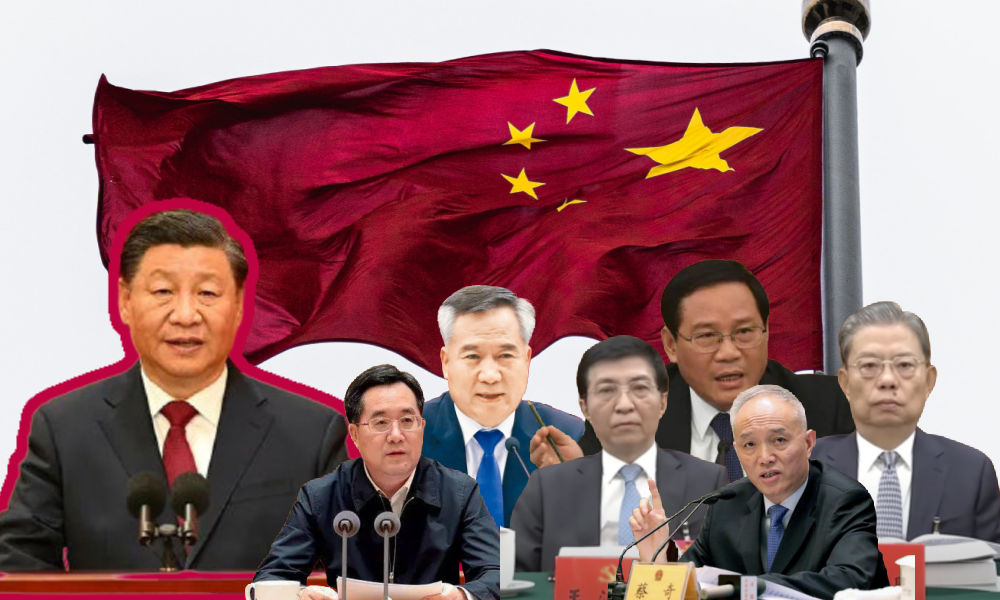
PREMIUM CONTENT ARTICLE
Which Party members will lead China in the next five years? These are the names you need to know: all the full members of China’s new Central Committee, the Politburo, and its Standing Committee.
The 20th Party Congress has concluded and China’s new leadership for the next five years has been revealed. All of the new full and alternate members of the 20th Central Committee were announced on October 22 and a day later, on October 23rd, the new seven-member Politburo Standing Committee was unveiled.
As was widely expected, Xi Jinping will continue his third five-year term as leader.
The lists with new member names went trending on Chinese social media. On Weibo alone, the hashtag “20th Central Committee Members List” (#二十届中央委员会委员名单#) received a staggering 580 million clicks within two days time. There were also other trending hashtags during the weekend of the closing session of the 20th Party Congress, such as “The Resumes of the New Politburo Standing Committee Members” (#新一届中央政治局常委简历#).
The Central Committee of the Chinese Communist Party (中国共产党中央委员会) is, theoretically, the highest authority within the Party pyramid, and its members (generally 170-205 full members) are nominally elected every five years by the National Party Congress. It is the primary authority of the Central Committee to elect the Politburo (中国共产党中央政治局), which actually is the top decision-making body in the Party (21-25 members).
Among the members of the Politburo are those of the Standing Committee (中国共产党中央政治局常务委员会), which basically is the core leadership of the Party (generally 5-11 members, including the Party General Secretary). This is the list of names that everyone has been mostly waiting to see this week.
Here, we will list the member names of China’s new 20th Central Committee, the Politburo, and its Standing Committee. We have put them in alphabetical order, based on the first letter of their written in pinyin, and have included all names in characters.
The 20th Central Committee (Full Members)
Noteworthy:
– The 19th Central Committee was composed of 204 full members (among them only 10 women), this 20th Central Committee list contains 205 full members and 11 of them are women.
– Nine of these members come from a minority ethnic group, including one Uyghur.
– Premier Li Keqiang and the head of the National People’s Congress, Li Zhanshu, the second- and third-highest ranking officials in the party, have not been included, neither have Wang Yang, the Chinese People’s Political Consultative Conference chairman and Vice-Premier Han Zheng.
Abbreviations:
– CMC = Central Military Commission
– CPC = Communist Party of China
– CSSC = China State Shipbuilding Corporation
– PLA = People’s Liberation Army
(The 171 alternate members of the 20th Central Committee, who do not have voting rights, have not been listed here).
1. Bate’er 巴特尔 (Mongolian) (Vice Chairperson of the National Committee of the Chinese People’s Political Consultative Conference)
2. Cai Jianjiang 蔡剑江 (Director of the Office of the Central Air Traffic Management Commission)
3. Cai Qi 蔡奇 (New Politburo Standing Committee member, Party Secretary of Beijing)
4. Chang Dingqiu 常丁求 (PLA General, Commander of PLA Air Force)
5. Chen Gang 陈刚 (Party Secretary of the All-China Federation of Trade Unions)
6. Chen Jining 陈吉宁 (New Politburo member, Deputy Party Secretary, Mayor of Beijing)
7. Chen Min’er 陈敏尔 (18th-20th Politburo member, Party Chief of Chongqing)
8. Chen Wenqing 陈文清 (New Politburo member, Ministry of State Security Minister, Party Secretary)
9. Chen Xiaojiang 陈小江 (Executive Deputy Head of the United Front Work Department of the CPC Central Committee)
10. Chen Xu 陈旭 (female) (Deputy Head of the CPC United Front Work Department, Director of the Overseas Chinese Affairs Office)
11. Chen Yixin 陈一新 (Secretary-General of the Central Political and Legal Affairs Commission)
12. Cheng Lihua 程丽华 (female) (Deputy Secretary of Anhui Provincial Party Committee)
13. Ding Xuedong 丁学东 (Deputy Secretary-General of the State Council of the People’s Republic of China)
14. Ding Xuexiang 丁薛祥 (New Politburo Standing Committee member, a senior aide to Xi Jinping)
15. Dong Jun 董军 (PLA Admiral, Commander of the People’s Liberation Army Navy)
16. Erkin Tuniyaz 艾尔肯·吐尼亚孜 (Uyghur) (Chairman of Xinjiang Uyghur Autonomous Region)
17. Feng Fei 冯飞 (Governor of Hainan)
18. Fu Hua 傅华 (President of Xinhua News Agency)
19. Gao Xiang 高翔 (Vice President, Deputy Secretary of the Party core group of the Chinese Academy of Social Sciences)
20. Gao Zhidan 高志丹 (Director of the State General Administration of Sports)
21. Gong Zheng 龚正 (Mayor and Deputy Communist Party Secretary of Shanghai Municipality)
22. Guo Puzheng 郭普校 (Political Commissar to the PLA Air Force)
23. Han Jun 韩俊 (Governor of Jilin Province)
24. Han Wenxiu 韩文秀 (Deputy Director, Research Office of the State Council)
25. Hao Peng 郝鹏 (Chairman and Party Committee Secretary of the State-owned Assets Supervision and Administration Commission)
26. He Hongjun 何宏军 (PLA Lieutenant General)
27. He Junke 贺军科 (First Secretary of the Communist Youth League of China)
28. He Lifeng 何立峰 (New Politburo member, head of the National Development and Reform Commission)
29. He Rong (female) 贺荣 (Deputy Chief Justice, Executive Vice president of the Supreme People’s Court of China)
30. He Weidong 何卫东 (New Politburo member, Commander of the CMC’s Joint Command Centre)
31. Hou Jianguo 侯建国 (former President of the University of Science and Technology of China)
32. Hou Kai 侯凯 (Member of Standing Committee of the Central Commission for Discipline Inspection, Auditor General of the National Audit Office)
33. Hu Changsheng 胡昌升 (Governor of Heilongjiang)
34. Hu Chunhua 胡春华 (former Politburo member, Vice Premier of the People’s Republic of China)
35. Hu Henghua 胡衡华 (Deputy Party Secretary and Mayor of Chongqing)
36. Hu Heping 胡和平 (Party Secretary of Ministry of Culture and Tourism)
37. Hu Yuting 胡玉亭 (Deputy Secretary of the Liaoning Provincial Committee)
38. Hu Zhongming 胡中明 (PLA Vice Admiral, Chief of Staff of the PLA Navy)
39. Huai Jinpeng 怀进鹏 (Party Secretary of the China Association for Science and Technology)
40. Huang Jianfa 黄建发 (Deputy Secretary of the Zhejiang Provincial Party Committee)
41. Huang Kunming 黄坤明 (19th/20th Politburo member, head of the CPC Publicity Department)
42. Huang Ming 黄铭 (PLA Lieutenant General, Chief of Staff of the PLA)
43. Huang Qiang 黄强 (Governor of Sichuan Province)
44. Huang Shouhong 黄守宏 (Director of the State Council Research Office)
45. Huang Xiaowei 黄晓薇 (female) (Party Decretary of the All-China Women’s Federation)
46. Jin Xiangjun 金湘军 (Deputy Mayor of Tianjin)
47. Jin Zhuanglong 金壮龙 (Minister of Industry and Information Technology)
48. Jing Junhai 景俊海 (Governor of Jilin)
49. Ju Qiansheng 巨乾生 (PLA General, Commander of the PLA Strategic Support Force)
50. Lan Fo’an 蓝佛安 (Governor of Shanxi)
51. Lan Tianli 蓝天立 (Zhuang ethnic group) (Chairman, Deputy Party Chief of Guangxi)
52. Lei Fanpei 雷凡培 (former Party Secretary, Chairman of CSSC)
53. Li Bingjun 李炳军 (Governor of Guizhou Province)
54. Li Fengbiao 李凤彪 (PLA General, Political commissar of the Western Theater Command)
55. Li Ganjie 李干杰 (New Politburo member, Party Secretary of Shandong)
56. Li Guoying 李国英 (Governor of Anhui province)
57. Li Hongzhong 李鸿忠 (also 19th/20th Politburo member, Tianjin Party Secretary)
58. Li Lecheng 李乐成 (Governor of Liaoning)
59. Li Qiang 李强 (New Politburo Standing Committee member, 19th/20th Politburo member and Party Secretary of Shanghai)
60. Li Qiaoming 李桥铭 (PLA General, former commander of the Northern Theater Command)
61. Li Shangfu 李尚福 (PLA General, Head of the Equipment Development Department of the Central Military Commission)
62. Li Shulei 李书磊 (New Politburo member, Executive Deputy Head of the Publicity Department)
63. Li Wei 李伟 (former Director of the Development Research Center of the State Council)
64. Li Xi 李希 (New Politburo Standing Committee member, 19th/20th Politburo member and Party Secretary of Guangdong, Secretary of the Central Commission for Discipline Inspection)
65. Li Xiaohong 李晓红 (President of the Chinese Academy of Engineering)
66. Li Xiaoxin 李小新 (female) (Vice Minister of the Organization Department of the CPC Central Committee (ODCPC)
67. Li Yi 李屹 (Party branch Secretary, Vice president of China Federation of Literary and Art Circles)
68. Li Yifei 李邑飞 (Deputy Secretary of the Party Committee of Xinjiang Uygur Autonomous Region)
69. Li Yuchao 李玉超 (PLA General, Commander of PLA Rocket Force)
70. Liang Huiling 梁惠玲 (female) (Chair of the All-China Federation of Supply and Marketing Cooperatives)
71. Liang Yanshun 梁言顺 (Party Secretary of Ningxia)
72. Lin Wu 林武 (Party Secretary of Shanxi)
73. Lin Xiangyang 林向阳 (PLA General, Commander of Eastern Theater Command)
74. Liu Faqing 刘发庆 (PLA Lieutenant General, Secretary-General of National Defense Mobilization Commission)
75. Liu Guozhong 刘国中 (New Politburo Member, Party Secretary of Shaanxi)
76. Liu Haixing 刘海星 (Deputy Director in the Office of the National Security Commission)
77. Liu Jianchao 刘建超 (Director of the International Liaison Department of the CPC)
78. Liu Jinguo 刘金国 (Deputy Secretary of the Central Commission for Discipline Inspection)
79. Liu Junchen 刘俊臣 (Deputy Secretary of Party Organs Working Committee)
80. Liu Ning 刘宁 (Party Secretary of Guangxi)
81. Liu Qingsong 刘青松 (PLA Admiral, Political Commissar of the Northern Theater Command)
82. Liu Wei 刘伟 (Chairman of the CPPCC Henan Committee)
83. Liu Xiaoming 刘小明 (former Ambassador of China to the United Kingdom)
84. Liu Zhenli 刘振立 (PLA General, Commander of the PLA Ground Force)
85. Lou Yangsheng 楼阳生 (Party Secretary of Henan Province)
86. Lu Hao 陆昊 (Party Branch Secretary of Development Research Center of the State Council)
87. Lu Zhiyuan 陆治原 (Deputy Secretary of Shandong Provincial Committee, Secretary of Qingdao Municipal Committee)
88. Luo Wen 罗文 (Head of China’s State General Administration for Market Regulation)
89. Ma Xiaowei马晓伟 (National Health Commission Director, Vice President of the Red Cross Society of China)
90. Ma Xingrui 马兴瑞 (New Politburo member, Xinjiang Party Secretary, former Guangdong governor)
91. Mao Weiming 毛伟明 (Governor of Hunan Province)
92. Meng Fanli 孟凡利 (Party Secretary of Shenzhen, Deputy Party Secretary of Guangdong)
93. Meng Xiangfeng 孟祥锋 (Executive Deputy Director of the General Office of CPC)
94. Miao Hua 苗华 (19th/20th CC, Admiral of the Chinese PLA Navy, Director of Political Work Department of Central Military Commission)
95. Ni Hong 倪虹 (Minister of Housing and Urban-Rural Development)
96. Ni Yuefeng 倪岳 峰 (Party Secretary of Hebei)
97. Nurlan Abelmanjen 努尔兰·阿不都满金 (Kazakh) (Chairman of the Xinjiang Regional Committee of the Chinese People’s Political Consultative Conference)
98. Pan Yue 潘岳 (Minister of the State Ethnic Affairs Commission)
99. Pei Jinjia 裴金佳 (Minister of Veterans Affairs)
100. Qi Yu 齐玉 (Secretary of the CPC Committee of the Ministry of Foreign Affairs)
101. Qin Gang 秦刚 (Chinese Ambassador to the United States)
102. Qin Shutong 秦树桐 (PLA General, Political Commissar of the PLA Ground Force)
103. Qu Qingshan 曲青山 (President of the Institute of Party History and Literature of the Central Committee of CPC)
104. Ren Zhenhe 任振鹤 (Tujia ethnic group) (Governor of Gansu Province)
105. Shen Chunyao 沈春耀 (Chairperson of the Legislative Affairs Committee of the Standing Committee of the National People’s Congress)
106. Shen Haixiong 慎海雄 (Propaganda Chief of Guangdong Province)
107. Shen Xiaoming 沈晓明 (former Governor of Hainan)
108. Shen Yiqing 谌贻琴 (female, Bai ethnic group) (Communist Party Secretary of Guizhou)
109. Shen Yueyue 沈跃跃 (female) (President of the All-China Women’s Federation)
110. Shi Taifeng 石泰峰 (New Politburo member, President of the Chinese Academy of Social Sciences)
111. Sun Jinlong 孙金龙 (Party Branch Secretary of the Xinjiang Production and Construction Corps)
112. Sun Shaocheng 孙绍骋 (Party Secretary of Inner Mongolia)
113. Tang Dengjie 唐登杰 (Minister of Civil Affairs)
114. Tang Renjian 唐仁健 (Governor of Gansu Province)
115. Tie Ning 铁凝 (female) (President of the China Writers Association)
116. Tong Jianming 童建明 (Grand Prosecutor and first Deputy Prosecutor General of the Supreme People’s Procuratorate)
117. Tuo Zhen 庹震 (President of the People’s Daily)
118. Wan Lijun 万立骏 (researcher, former President of the University of Science and Technology of China)
119. Wang Chunning 王春宁 (PLA General, Commander of the People’s Armed Police)
120. Wang Dongming 王东明 (Vice Chairman of the Standing Committee, Chairman of the All-China Federation of Trade Unions)
121. Wang Guanghua 王广华 (Minister of Natural Resources)
122. Wang Haijiang (PLA General, Commander of Western Theater Command)
123. Wang Hao 王浩 (Governor of Zhejiang)
124. Wang Huning 王沪宁 (Politburo Standing Committee since 2017, 19th/20th Politburo member, First Secretary of the Secretariat of the Chinese Communist Party)
125. Wang Junzheng 王君正 (Communist Party Secretary of Tibet)
126. Wang Kai 王凯 (Governor of Henan Province)
127. Wang Kai 王凯 (Lieutenant General of the PLA)
128. Wang Lixia 王莉霞 (female, Mongolian) (Deputy Party Chief, Party branch Secretary, Chairwoman of the Inner Mongolia Autonomous Region)
129. Wang Menghui 王蒙徽 (Communist Party Secretary of Hubei)
130. Wang Ning 王宁 (Party Secretary of Yunnan)
131. Wang Peng 王鹏 (Vice President and Chief of Education of the People’s Liberation Army National Defence University)
132. Wang Qiang 王强 (PLA General, Commander of the North Sea Fleet)
133. Wang Qingxian 王清宪 (Governor of Anhui)
134. Wang Renhua 王仁华 (Vice Admiral of the PLA, Secretary of the Political and Legal Affairs Commission of the Central Military Commission)
135. Wang Shouwen 王受文 (China International Trade Representative, Vice Minister of Commerce)
136. Wang Weizhong 王伟中 (Deputy Party Secretary, Governor of Guangdong)
137. Wang Wenquan 王文全 (Political Commissar of the Joint Logistics Support Unit of the Central Military Commission)
138. Wang Wentao 王文涛 (Minister of Commerce)
139. Wang Xiangxi 王祥喜 (Minister of Emergency Management)
140. Wang Xiaohong 王小洪 (Party Secretary, Minister of Public Security)
141. Wang Xiaohui 王晓晖 (Party Secretary of Sichuan)
142. Wang Xiubin 王秀斌 (PLA General, Commander of the Southern Theater Command)
143. Wang Yi 王毅 (New Politburo member, State Councillor and Foreign Minister)
144. Wang Yong 王勇 (Chinese State Councilor)
145. Wang Yubo 王予波 (Governor of Yunnan Province)
146. Wang Zhengpu 王正谱 (Governor of Hebei)
147. Wang Zhijun 王志军 (Vice Minister of the Ministry of Industry and Information Technology)
148. Wang Zhonglin 王忠林 (Governor of Hubei)
149. Wu Hansheng 吴汉圣 (Deputy Secretary of Work Committee of Central Government in charge of Daily Work)
150. Wu Xiaojun 吴晓军 (Governor of Qinghai)
151. Wu Yanan 吴亚男 (General of the PLA, Commander of the Central Theater Command)
152. Wu Zhenglong 吴政隆 (Secretary of Jiangsu)
153. Xi Jinping 习近平 (General Secretary of the Party, President PRC, Chairman of the Central Military Commission)
154. Xiao Jie 肖捷 (State Councilor, Secretary General of the State Council)
155. Xiao Pei 肖培 (Deputy Secretary of the CPC Committee for Discipline and Inspection)
156. Xie Chuntao 谢春涛 (Vice President of the Central Party School of the Chinese Communist Party)
157. Xin Changxing 信长星 (Party Secretary of Qinghai)
158. Xu Deqing 徐德清 (General of PLA, Political Commissar of the Central Theater Command)
159. Xu Kunlin 许昆林 (Governor of Jiangsu)
160. Xu Lin 徐麟 (Director of the National Radio and Television Administration)
161. Xu Qiling 徐起零 (General of the PLA)
162. Xu Qin 许勤 (Former Governor of Hebei)
163. Xu Xisheng 徐西盛 (Political Commissar of Southern Theater Command Air Force)
164. Xu Xueqiang 许学强 (General of the PLA, President of PLA National Defence University)
165. Xu Zhongbo 徐忠波 (PLA General, Political Commissar of PLA Army Rocket Force)
166. Yan Jinhai (Tibetan) (Chairman of Tibet Autonomous Region)
167. Yang Cheng 杨诚 (Lieutenant General of the PLA, Political Commissar of the Xinjiang Military District)
168. Yang Xuejun 杨学军 (President of the PLA Academy of Military Science)
169. Yang Zhiliang 杨志亮 (Vice Admiral of the PLA Navy, Political Commissar of the South Sea Fleet)
170. Ye Jianchun 叶建春 (Governor of Jiangxi)
171. Yi Huiman 易会满 (Head of the China Securities and Regulatory Commission)
172. Yi Lianhong 易炼红 (Party Secretary of Jiangxi)
173. Yin Hejun 阴和俊 (Deputy Secretary of the Party Committee of the Chinese Academy of Sciences)
174. Yin Hong 尹弘 (former Governor of Henan Province)
175. Yin Li 尹力 (New Politburo member / Communist Party Secretary of Fujian)
176. Yin Yong 殷勇 (Deputy Prosecutor-General of the Supreme People’s Procuratorate)
177. Ying Yong (deputy party chief of the municipality of Beijing and a former deputy governor of the People’s Bank of China)
178. Yu Jianhua 俞建华 (Head of the General Administration of Customs)
179. Yu Qingjiang 俞庆江 (Lieutenant General of the PLA Air Force, Chief of Staff of PLA)
180. Yuan Huazhi 袁华智 (Admiral and Political Commissar of the PLA)
181. Yuan Jiajun 袁家军 (New Politburo member, Zhejiang Party Secretary)
182. Zhang Gong 张工 (Mayor of Tianjin)
183. Zhang Guoqing 张国清 (New Politburo member, Party Secretary of Liaoning)
184. Zhang Hongbing 张红兵 (PLA Political Commissar)
185. Zhang Hongsen 张宏森 (Party Branch Secretary of China Writers Association)
186. Zhang Jun 张军 (Procurator-General of the Supreme People’s Procuratorate)
187. Zhang Lin 张林 (Head of the Logistic Support Department of the Central Military Commission)
188. Zhang Qingwei 张庆伟 (Secretary of Hunan, former Governor of Hebei)
189. Zhang Shengmin 张升民 (Secretary of the Commission for Discipline Inspection of the Central Military Commission of PLA)
190. Zhang Youxia 张又侠 (19th/20th Politburo member, General in the PLA, second-ranked Vice Chairman of the Central Military Commission)
191. Zhang Yupu 张雨浦 (Hui) (Chairman of Ningxia Hui Autonomous Region)
192. Zhang Yuzhuo 张玉卓 (Party branch secretary of the China Association for Science and Technology)
193. Zhao Gang 赵刚 (Member Standing Committee of Zaozhuang Municipal Committee)
194. Zhao Leji 赵乐际 (Politburo member since 2012, secretary of the Central Commission for Discipline Inspection, former Head of the CPC Organization Department)
195. Zhao Long 赵龙 (Governor of Fujian)
196. Zhao Xiaozhe 赵晓哲 (Vice Admiral of PLA and Director of Science and Technology Committee of the Central Military Commission)
197. Zhao Yide 赵一德 (Governor of Shaanxi, former Governor/Deputy Secretary of Hebei)
198. Zheng Shanjie 郑栅洁 (Governor/Deputy Party Secretary of Zhejiang and Party Secretary of Ningbo)
199. Zheng Xincong 郑新聪 (Director of Liaison Office in Macau, former Deputy Governor Fujian)
200. Zhong Shaojun 钟绍军 (aide of Xi Jinping, Director of the General Office of the Central Military Commission of People’s Liberation Army)
201. Zhou Naixiang 周乃翔 (Governor of Shandong)
202. Zhou Qiang 周强 (Chief Justice and President of the Supreme People’s Court of China)
203. Zhou Zuyi 周祖翼 (Minister of Human Resources and Social Security)
204. Zhuang Rongwen 庄荣文 (Director of the Cyberspace Administration of China)
205. Zou Jiayi 邹加怡 (female) (Vice Minister of the Ministry of Finance)
20th Politburo Members
Noteworthy:
– For the first time in 25 years, there are no female members in this list.
1. Cai Qi 蔡奇 (New Politburo Standing Committee member, Party Secretary of Beijing)
2. Chen Jining 陈吉宁 (New Politburo member, Deputy Party Secretary and mayor of Beijing)
3. Chen Min’er 陈敏尔 (18th-20th Politburo member and party chief of Chongqing)
4. Chen Wenqing 陈文清 (New Politburo member, Ministry of State Security Minister&Party Secretary)
5. Ding Xuexiang 丁薛祥 (New Politburo Standing Committee member, a senior aide to Xi Jinping)
6. He Lifeng 何立峰 (New Politburo member, head of the National Development and Reform Commission)
7. He Weidong 何卫东 (New Politburo member, Commander of the CMC’s Joint Command Centre)
8. Huang Kunming 黄坤明 (19th/20th Politburo member, head of the CPC Publicity Department)
9. Li Ganjie 李干杰 (New Politburo member, Party Secretary of Shandong)
10. Li Hongzhong 李鸿忠 (also 19th/20th Politburo member, Tianjin Party Secretary)
11. Li Qiang 李强 (New Politburo Standing Committee member, 19th/20th Politburo member and Party Secretary of Shanghai)
12. Li Shulei 李书磊 (New Politburo member, Executive Deputy Head of the Publicity Department)
13. Li Xi 李希 (New Politburo Standing Committee member, 19th/20th Politburo member and Party Secretary of Guangdong, Secretary of the Central Commission for Discipline Inspection)
14. Liu Guozhong 刘国中 (New Politburo Member, Party Secretary of Shaanxi)
15. Ma Xingrui 马兴瑞 (New Politburo member, Xinjiang Party Secretary, former Guangdong governor)
16. Shi Taifeng 石泰峰 (New Politburo member, President of the Chinese Academy of Social Sciences)
17. Wang Huning 王沪宁 (Politburo Standing Committee since 2017, 19th/20th Politburo member, First Secretary of the Secretariat of the Chinese Communist Party)
18. Wang Yi 王毅 (New Politburo member, State Councillor and Foreign Minister)
19. Xi Jinping 习近平 (General Secretary of the Party, President PRC, Chairman of the Central Military Commission)
20. Yin Li 尹力 (New Politburo member, Party Secretary of Fujian)
21. Yuan Jiajun 袁家军 (New Politburo member, Zhejiang Party Secretary)
22. Zhang Guoqing 张国清 (New Politburo member, Party Secretary of Liaoning)
23. Zhang Youxia 张又侠 (19th/20th Politburo member, General in the PLA, second-ranked Vice Chairman of the Central Military Commission)
24. Zhao Leji 赵乐际 (Politburo member since 2012, secretary of the Central Commission for Discipline Inspection, former Head of the CPC Organization Department)
20th Politburo Standing Committee
Noteworthy:
– Four of the members are new to the Standing Committee.
– Li Keqiang, Wang Yang, Wang Qishan, and Li Zhanshu are gone from the Standing Committee.
– No female members – there never have been in the Standing Committee.
1. Cai Qi 蔡奇 (New Politburo Standing Committee member, Party Secretary of Beijing)
2. Ding Xuexiang 丁薛祥 (New Politburo Standing Committee member, a senior aide to Xi Jinping)
3. Li Qiang 李强 (New Politburo Standing Committee member, 19th/20th Politburo member and Party Secretary of Shanghai)
4. Li Xi 李希 (New Politburo Standing Committee member, 19th/20th Politburo member and Party Secretary of Guangdong, Secretary of the Central Commission for Discipline Inspection)
5. Xi Jinping 习近平 (General Secretary of the Party, President PRC, Chairman of the Central Military Commission)
6. Wang Huning 王沪宁 (Politburo Standing Committee since 2017, 19th/20th Politburo member, First Secretary of the Secretariat of the Chinese Communist Party)
7. Zhao Leji 赵乐际 (Politburo member since 2012, secretary of the Central Commission for Discipline Inspection, former Head of the CPC Organization Department)
For more about the Party Congress, check our other articles here.
If you appreciate the work we do, please subscribe to What’s on Weibo to support us
By Manya Koetse
Sources (other sources linked to inside text)
Reuters. 2022. “Factbox: China’s new elite Communist Party leadership.” Reuters, Oct 23 https://www.reuters.com/world/china/chinas-new-elite-communist-party-leadership-2022-10-23/ [Oct 23 2022].
Sullivan, Lawrence R. 2012. Historical Dictionary of the Chinese Communist Party. Lanham: The Scarecrow Press. See page: 3-43, 208.
Saich, Tony. 2004. Governance and Politics of China. Hampshire: Palgrave Macmillan. See page: 97.
Image of Chinese Flag
Photo by Alejandro Luengo on Unsplash
Get the story behind the hashtag. Subscribe to What’s on Weibo here to receive our newsletter and get access to our latest articles:
Spotted a mistake or want to add something? Please let us know in comments below or email us. First-time commenters, please be patient – we will have to manually approve your comment before it appears.
©2022 Whatsonweibo. All rights reserved. Do not reproduce our content without permission – you can contact us at info@whatsonweibo.com.
Manya is the founder and editor-in-chief of What's on Weibo, offering independent analysis of social trends, online media, and digital culture in China for over a decade. Subscribe to gain access to content, including the Weibo Watch newsletter, which provides deeper insights into the China trends that matter. More about Manya at manyakoetse.com or follow on X.

You may like
China Brands, Marketing & Consumers
Signals: Hasan Piker’s China Trip & the Unexpected Journey of a Chinese School Uniform to Angola
Hasan Piker’s controversial China tour, a Chinese school uniform resurfaces in Africa, a new winter hotspot, why Chinese elites ‘run’ to Tokyo, and more.
Published
2 months agoon
November 21, 2025
🌊 Signals — Week 47 (2025)
Part of Eye on Digital China, Signals highlights slower trends and online currents behind the daily scroll. This edition was sent to paid subscribers — subscribe to receive the next issue in your inbox.
Welcome to another edition of Eye on Digital China. Different from the China Trend Watch (check the latest one here if you missed it), this edition, part of the new Signals series, is about the slower side of China’s social media: the recurring themes and underlying shifts that signal broader trends beyond the quick daily headlines. Together with the deeper dives, the three combined aim to give you clear updates and a fuller overview of what’s happening in China’s online conversations & digital spaces.
For the coming two weeks, I’ll be traveling from Beijing to Chongqing and beyond (more on that soon) so please bear with me if my posting frequency dips a little. I’ll be sure to pick it up again soon and will do my best to keep you updated along the way. In the meantime, if you know of a must-try hotpot in Chongqing, please do let me know.
In this newsletter: Hasan Piker’s controversial China tour, a Chinese school uniform in Angola, a new winter hotspot, discussions on what happens to your Wechat after you die, why Chinese elites rùn to Tokyo, and more. Let’s dive in.
- 💰 The richest woman in China, according to the latest list by Hurun Research Institute, is the “queen of pharmaceuticals” Zhong Huijuan (钟慧娟) who has accumulated 141 billion yuan (over 19 billion USD). Women account for over 22% of Chinese billionaires (those with more than 5 billion RMB), underscoring China’s globally leading position in producing wealthy female entrepreneurs.
- 🧩 What happens to your WeChat after you die? A user who registered for NetEase Music with a newly reassigned phone number unexpectedly gained access to the late singer Coco Lee’s (李玟) account, as the number had originally belonged to her. The incident has reignited debate over how digital accounts should be handled after death, prompting platforms like NetEase and Tencent to reconsider policies on long-inactive accounts and take stronger measures to protect them.
- 📱 Although millions of viewers swoon over micro-dramas with fantasy storylines where rich, powerful men win over the “girl next door” through money and status, Chinese regulators are now stepping in to curb exaggerated plots featuring the so-called “dominant CEO” (霸道总裁) archetype, signaling stricter oversight for the booming short drama market.
- ☕ A popular Beijing coffee chain calling itself “People’s Cafe” (人民咖啡馆), with its style and logo evoking nationalist visual nostalgia, has changed its name after facing criticism for building its brand – including pricey coffee and merchandise – on Mao era and state-media political connotations. The cafe is now ‘Yachao People’s Cafe’ (要潮人民咖啡馆).
- 👀 Parents were recently shocked to see erotic ads appear on the Chinese nursery rhymes and children’s learning app BabyBus (宝宝巴士), which is meant for kids ages 0–8. BabyBus has since apologized, but the incident has sparked discussions about how to keep children safe from such content.
- 🧧The 2026 holiday schedule has continued to be a big topic of conversation as it includes a 9-day long Spring Festival break (from February 15 to February 23), making it the longest Lunar New Year holiday on record. The move not only gives people more time for family reunions, but also gives a huge boost to the domestic travel industry.
Hasan Piker’s Chinese Tour & The US–China Content Honeymoon
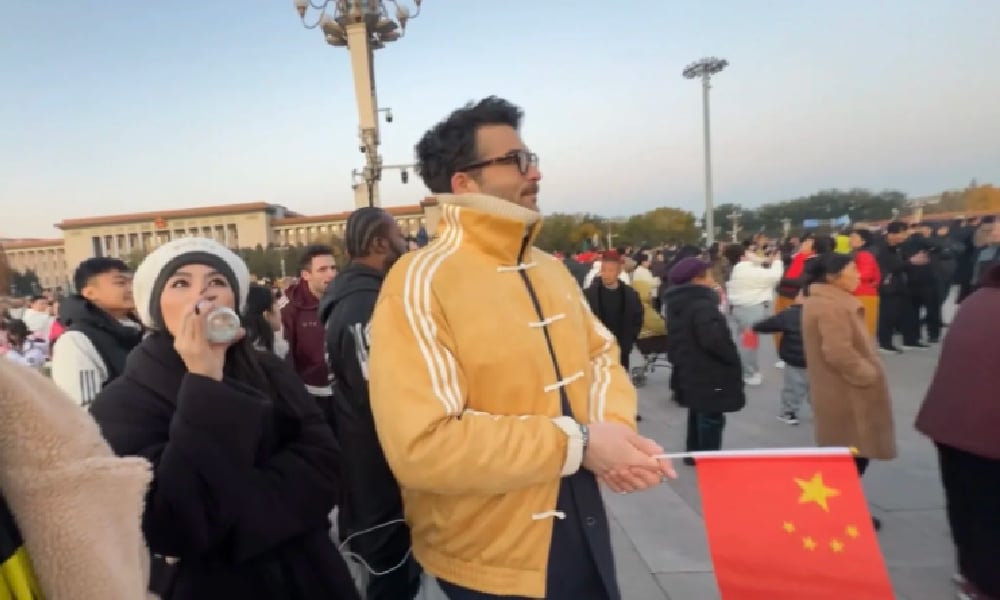
Livestreamer Hasan Piker during his visit to Tiananmen Square flag-rising ceremony.
It’s not time for the end-of-year overviews just yet – but I’ll already say that 2025 was the US–China ‘honeymoon’ year for content creation. It’s when China became “cool,” appealing, and eye-grabbing for young Western social media users, particularly Americans. The recent China trip of the prominent American online streamer Hasan Piker fits into that context.
This left-wing political commentator also known as ‘HasanAbi’ (3 million followers on Twitch, recently profiled by the New York Times) arrived in China for a two-week trip on November 11.

Piker screenshot from the interview with CGTN, published on CGTN.
His visit has been controversial on English-language social media, especially because Piker, known for his criticism of America (which he calls imperialist), has been overly praising China: calling himself “full Chinese,” waving the Chinese flag, joining state media outlet CGTN for an interview on China and the US, and gloating over a first-edition copy of Quotations from Chairman Mao (the Little Red Book). He portrays China as heavily misrepresented in the West and as a country the United States should learn from.
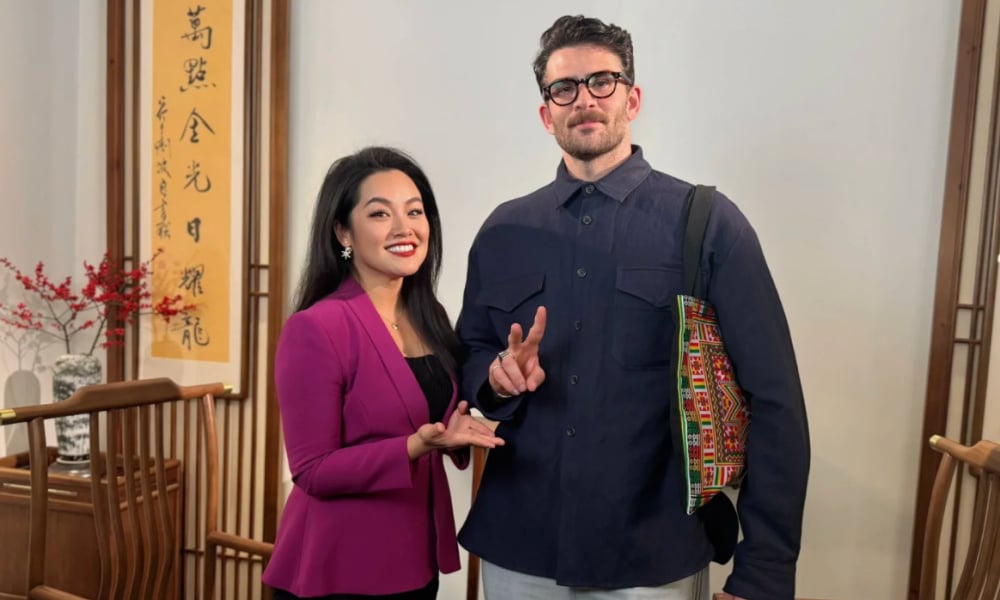
Hasan Piker did an interview with CGTN, posing with Li Jingjing 李菁菁.
During his livestreaming tour, Hasan, who is nicknamed “lemonbro” (柠檬哥) by Chinese netizens, also joined Chinese platforms Bilibili and Xiaohongshu.
But despite all the talk about Piker in the American online media sphere, online conversations, clicks, and views within China are underwhelming. As of now, he has around 24,000 followers on Bilibili, and he’s barely a topic of conversation on mainstream feeds.
Piker’s visit stands in stark contrast to that of American YouTuber IShowSpeed (Darren Watkins), who toured China in March. With lengthy livestreams from Beijing to Chongqing, his popularity exploded in China, where he came to be seen by many as a representative of cultural diplomacy.

IShowspeed in China, March 2025.
IShowSpeed’s success followed another peak moment in online US–China cultural exchange. In January 2025, waves of foreign TikTok users and popular creators migrated to the Chinese lifestyle app Xiaohongshu amid the looming TikTok ban.
Initially, the mass migration of American users to Xiaohongshu was a symbolic protest against Trump and US policies. In a playful act of political defiance, they downloaded Xiaohongshu to show they weren’t scared of government warnings about Chinese data collection. (For clarity: while TikTok is a made-in-China app, it is not accessible inside mainland China, where Douyin is the domestic version run by the same parent company).
The influx of foreigners — who were quickly nicknamed “TikTok refugees” — soon turned into a moment of cultural celebration. As American creators introduced themselves, Chinese users welcomed them warmly, eager to practice English and teach newcomers how to navigate the app. Discussions about language, culture, and societal differences flourished. Before long, “TikTok refugees” and “Xiaohongshu natives” were collaborating on homework assignments, swapping recipes, and bonding through humor. It was a rare moment of social media doing what we hope it can do: connect people, build bridges, and replace prejudice with curiosity.
Some of that same enthusiasm was also visible during IShowSpeed’s China tour. Despite the tour inevitably getting entangled with political and commercial interests, much of it was simply about an American boy swept up in the high energy of China’s vibrant cities and everything they offer.
Different from IShowSpeed, who is known for his meme-worthy online presence, Piker is primarily known for his radical political views. His China enthusiasm feels driven less by cultural curiosity and more by his critique of America.
Because of his stances — such as describing the US as a police state — it’s easy for Western critics to accuse him of hypocrisy in praising China, especially after a brief run-in with security police while livestreaming at Tiananmen Square.
Seen in broader context, Piker’s China trip reflects a shift in how China is used in American online discourse.
Before, it was Chinese ‘public intellectuals’ (公知) who praised the US as a ‘lighthouse country’ (灯塔国), a beacon of democracy, to indirectly critique China and promote a Western modernization model. Later, Chinese online influencers showcased their lives abroad to emphasize how much ‘brighter the moon’ was outside China.
In the post-Covid years, the current reversed: Western content creators, from TikTok influencers to political commentators, increasingly use China to make arguments that are fundamentally about America.
Between these cycles, authentic cultural curiosity gets pushed to the sidelines. The TikTok-refugee moment in early January may have been the closest we’ve come in years: a brief window where Chinese and American users met each other with curiosity, camaraderie, and creativity.
Hasan’s tour, in contrast, reflects a newer phase, one where China is increasingly used as a stage for Western political identity rather than a complex and diverse country to understand on its own terms. I think the honeymoon phase is over.
“Liu Sihan, Your School Uniform Ended Up in Angola”: China’s Second-Hand Clothing in Africa

A Chinese school uniform went viral after a Chinese social media user spotted it in Angola.
“Liu Sihan, your schooluniform is hot in Africa” (刘思涵你的校服在非洲火了) is a sentence that unexpectedly trended after a Chinese blogger named Xiao Le (小乐) shared a video of a schoolkid in Angola wearing a Chinese second-hand uniform from Qingdao Xushuilu Primary School, that had the nametag Liu Sihan on it.
The topic sparked discussions about what actually happens to clothing after it’s donated, and many people were surprised to learn how widely Chinese discarded clothing circulates in parts of Africa.
Liu Sihan’s mother, whose daughter is now a 9th grader in Qingdao, had previously donated the uniform to a community clothing donation box (社区旧衣回收箱) after Liu outgrew it. She intended it to help someone in need, never imagining it to travel all the way to Africa.
In light of this story, one netizen shared a video showing a local African market selling all kinds of Chinese school items, including backpacks, and people wearing clothing once belonging to workers for Chinese delivery platforms. “In Africa, you can see school uniforms from all parts of China, and even Meituan and Eleme outfits,” one blogger wrote.
When it comes to second-hand clothing trade, we know much more about Europe–Africa and US–Africa flows than about Chinese exports, and it seems there haven’t been many studies on this specific topic yet. Still, alongside China’s rapid economic transformations, the rise of fast fashion, and the fact that China is the world’s largest producer and consumer of textiles, the country now has an enormous abundance of second-hand clothing.
According to a 2023 study by Wu et al. (link), China still has a long way to go in sustainable clothing disposal. Around 40% of Chinese consumers either keep unwanted clothes at home or throw them away.
But there may be a shift underway. Donation options are expanding quickly, from government bins to brand programs, and from second-hand stores to online platforms that offer at-home pickup.
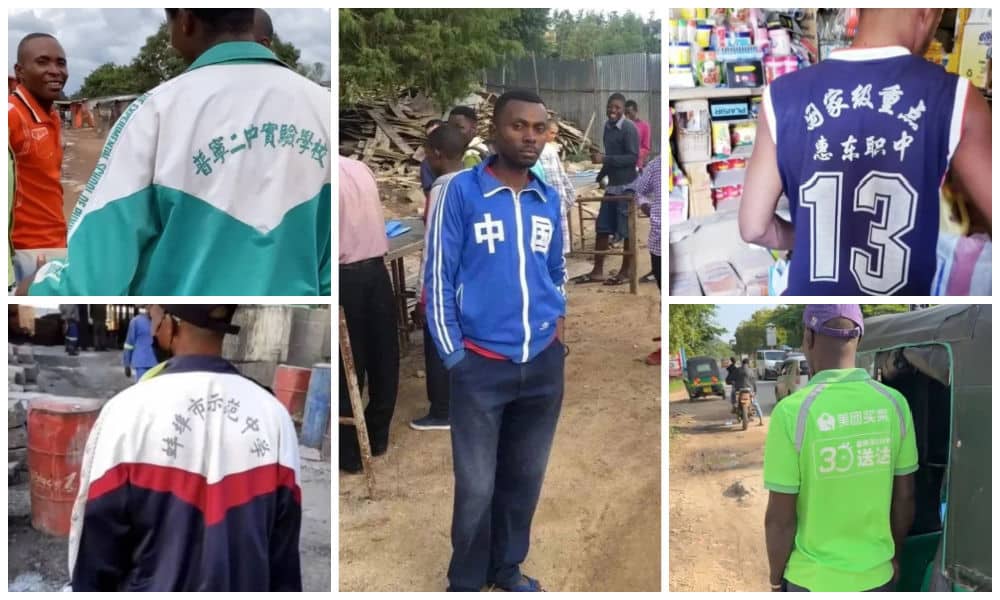
Chinese social media users posting images of school/work uniforms from China worn by Africans.
As awareness grows around the benefits of donating clothing (reducing waste, supporting sustainability, and the emotional satisfaction of giving), donation rates may rise significantly. The story of Liu Sihan’s uniform, which many found amusing, might even encourage more people to donate. And if that happens, scenes of African children (and adults) wearing Chinese-donated clothes may become much more common than they now are.
Laojunshan: New Hotspot in Cold Winter
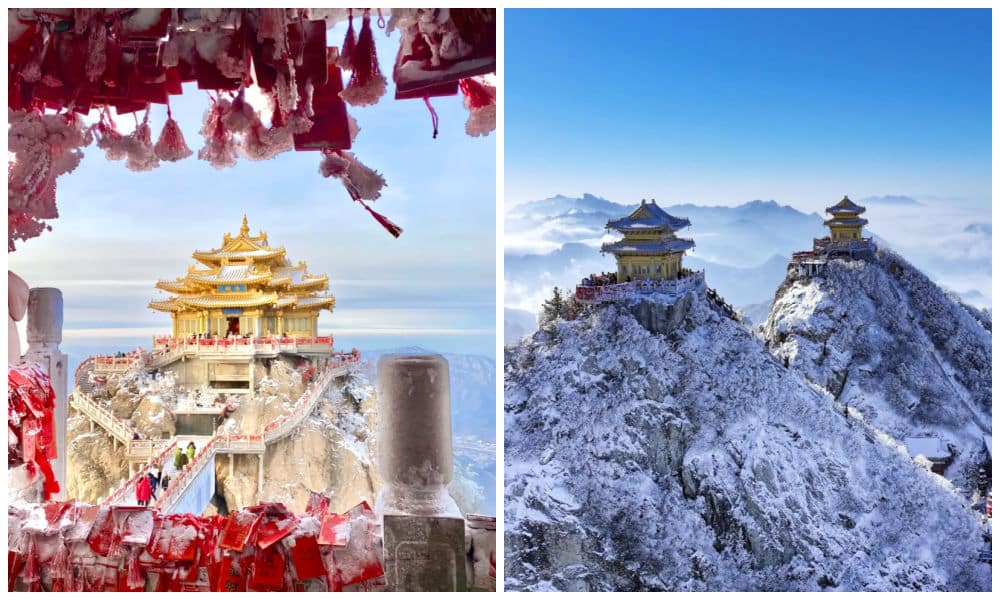
Images from Xiaohongshu, 背包里的星子, 旅行定制师小漾
Go to Zibo for BBQ, go to Tianshui for malatang, go to Harbin for the Ice Festival, cycle to Kaifeng for soup dumplings, or head to Dunhuang to ride a camel — over recent years, a number of Chinese domestic destinations have turned into viral hotspots, boosted by online marketing initiatives and Xiaohongshu influencers.
This year, Laojunshan is among the places climbing the trending lists as a must-visit spot for its spectacular snow-covered landscapes that remind many of classical Chinese paintings. Laojunshan (老君山), a scenic mountain in Henan Province, is attracting more domestic tourists for winter excursions.
Xiaohongshu is filled with travel tips: how to get there from Luoyang station (by bus), and the best times of day to catch the snow in perfect light (7–9 AM or around 6–6:30 PM).
With Laojunshan, we see a familiar pattern: local tourism bureaus, state media, and influencers collectively driving new waves of visitors to the area, bringing crucial revenue to local industries during what would otherwise be slower winter months.
WeChat New Features & Hong Kong Police on Douyin
🟦 WeChat has been gradually rolling out a new feature that allows users to recall a batch of messages all at once, which saves you the frantic effort of deleting each message individually after realizing you sent them to the wrong group (or just regret a late-night rant). Many users are welcoming the update, along with another feature that lets you delete a contact without wiping the entire chat history. This is useful for anyone who wants to preserve evidence of what happened before cutting ties.
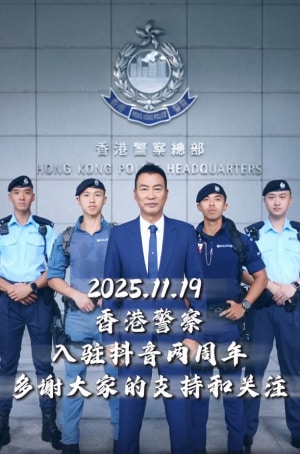
🟦The Hong Kong Police Force recently celebrated its two-year anniversary on Douyin (the Chinese version of TikTok), having accumulated nearly 5 million followers during that time. To mark the occasion, they invited actor Simon Yam to record a commemorative video for their channel (@香港警察). The presence of the Hong Kong Police on the Chinese app — and the approachable, meme-friendly way they’ve chosen to engage with younger mainland audiences — is yet another signal of Hong Kong institutions’ strategic alignment with mainland China’s digital infrastructure, a shift that has been gradually taking place. The anniversary video proved popular on Douyin, attracting thousands of likes and comments.
Why Chinese Elite Rùn to Japan (by ChinaTalk)
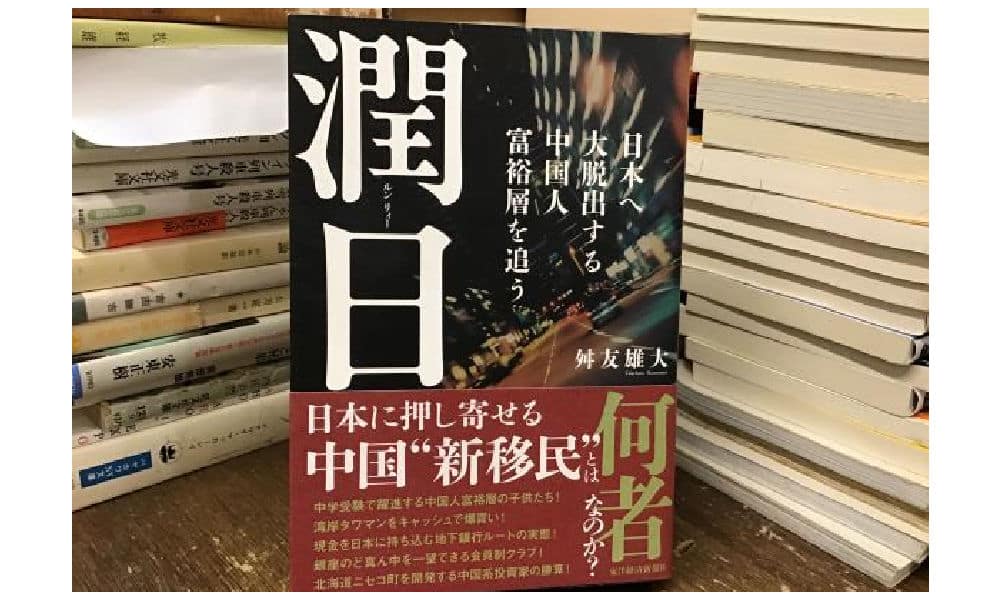
Over the past week, Japan has been trending every single day on Chinese social media in light of escalating bilateral tensions after Japanese PM Takaichi made remarks about Taiwan that China views as a direct military threat. The diplomatic freeze is triggering all kinds of trends, from rising anti-Japanese sentiment online and a ban on Japanese seafood imports to Chinese authorities warning citizens not to travel to Japan.
You’d think Chinese people would want to be anywhere but Japan right now — but the reality is far more nuanced.
In a recent feature in ChinaTalk, Jordan Schneider interviewed Japanese journalist & researcher Takehiro Masutomo (舛友雄大) who has just published a book about Japan’s new Chinese diaspora, explaining what draws Chinese dissidents, intellectuals, billionaires, and middle-class families to Tokyo.
The book is titled Run Ri: 潤日 Following the Footsteps of Elite Chinese Escaping to Japan (only available in Japanese and Traditional Chinese for now). (The word Rùn 润/潤, by the way, is Chinese online slang and meme expresses the desire to escape the country.)
A very interesting read on how Chinese communities are settling in Japan, a place they see as freer than Hong Kong and safer than the U.S., and one they’re surprisingly optimistic about — even more so than the Japanese themselves.
Thanks for reading this Eye on Digital China Signals. For fast-moving trends and deeper dives, keep an eye on the upcoming newsletters.
And if you just so happen to be reading this without a subscription and appreciate my work, consider joining to receive future issues straight in your inbox.
A small housekeeping note:
This Eye on Digital China newsletter is co-published for subscribers on both Substack and the main site. If you’re registered on both platforms, you’ll receive duplicate emails — so if that bothers you, please pick your preferred platform and unsubscribe from the other.
Many thanks to Miranda Barnes for helping curate some of the topics in this edition.
— Manya
Spotted an error or want to add something? Comment below or email me.
First-time commenters require manual approval.
©2025 Eye on Digital China / What’s on Weibo. Do not reproduce without permission —
contact info@whatsonweibo.com.
China Insight
“Jiangyou Bullying Incident”: From Online Outrage to Offline Protest
“You think we’re scared of you? It’s not like we haven’t been to jail before.”
Published
5 months agoon
August 6, 2025
These days have been filled with tension and anger in the city of Jiangyou (江油市), Sichuan, after a rare, large-scale protest broke out following public outrage over a severe bullying incident and how it was handled.
The bullying incident at the center of this story happened outside school premises in Mianyang on the afternoon of July 22. Footage of the assault, recorded by bystanders at the scene, began circulating widely online on August 2, sparking widespread outrage among concerned netizens, many of them worried parents.
The violent altercation involved three girls between the ages of 13 and 15 who ganged up on another minor, a 14-year-old girl named Lai (赖).
After Lai and a 15-year-old girl named Liu (刘) reportedly had a dispute, Liu gathered two of her friends—the 13-year-old also named Liu (刘) and a 14-year-old named Peng (彭)—to gang up on Lai.
The three underage girls lured Lai to an abandoned building, where they subjected her to hours of verbal and physical violence. The footage showed how they took turns in kicking, slapping, and pushing her.
At one point, after Lai said she would call the police, one of the bullies yelled: “You think we’re scared of you? It’s not like we haven’t been to jail before. I’ve been in more than ten times—it doesn’t even take 20 minutes to get out” (“你以为我们会怕你吗?又不是没进去过,我都进去十多次了,没二十分钟就出来了”).
That same night, the incident was reported to police. It took authorities until August 2 to bring in all involved parties for questioning, and a police report was issued on the morning of Monday, August 4.
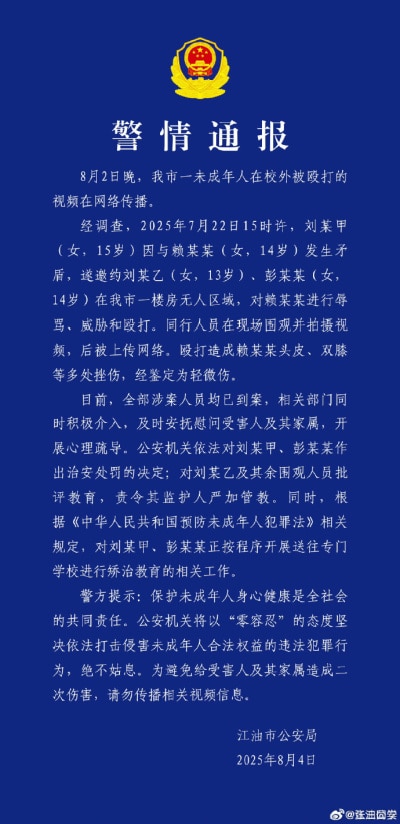
Police report by Jiangyou Public Security Bureau, confirming the details of the incident and the (legal) consequences for the attackers.
Two of the girls (the 15- and 14-year-old) were given administrative penalties and will be sent to a specialized correctional school. The younger Liu and other bystanders were formally reprimanded.
“Parents Speak Out for the Bullied Girl”
The way the incident was handled—not just the relatively late official report, but mostly the perceived lenient punishment—triggered anger online.
Many people who had seen the video responded emotionally and felt that the underage girls should be stripped of their rights to take their exams, and that the bullying incident should forever haunt them in the same way it will undoubtedly haunt their victim.
Especially the phrase “It’s not like I haven’t been taken in [to jail] before” struck a chord, as it showed just how calculated the bullies were—and how, by counting on the leniency of the Chinese judicial system for minors, they made the system complicit in their determination to turn those hours into a living hell for Lai.
China has been dealing with an epidemic of school violence for years. In 2016, Chinese netizens were already urging authorities to address the problem of extreme bullying in schools, partly because minors under the age of 16 rarely face criminal punishment for their actions.
Since 2021, children between the ages of 12 and 14 can be held criminally responsible for extreme and cruel cases resulting in death or disability—but their legal prosecution must first be approved by the Supreme People’s Procuratorate (SPP).
It has not done much to stop the violence.
Discussions around extreme bullying like this have repeatedly flared up over the years, such as in 2020, when a 15-year-old schoolboy named Yuan (袁) in Shaanxi was fatally beaten and buried by a group of minors.
Last year, a young boy named Wang Ziyao (王子耀) was killed by three classmates after suffering years of bullying. His body was found in a greenhouse just 100 meters from the home of one of the suspects, and the case shocked and enraged local residents.
But the problem is widespread among girls, too.
In 2016, we already reported on how so-called ‘campus violence videos’ (校园暴力视频) had become a concerning trend. In these kinds of videos—often showing multiple bullies beating up a single victim on camera—it’s not uncommon to see girls as the aggressors.
Girls often form cliques to gang up on a victim to show that they are in control or to gain popularity. They also tend to be more inclined than boys to make cruel jokes or stage pranks meant to embarrass or humiliate their target. This may partly explain why there seem to be more campus violence videos on Chinese social media showing girls bullying girls than boys bullying boys.
In the case of Lai, she appears to have been particularly vulnerable. One of her relatives posted online that her mother is deaf and mute, and her father allegedly is disabled. This fact may have contributed to why Lai was repeatedly targeted and bullied by the same group of girls, who reportedly took away her phone and socially isolated her at school.
In response to the incident, netizens started posting the hashtag “Parents Speak Up for the Bullied Girl” (“#家长们为被霸凌女孩发声#), not only to support Lai and her family, but to demand harsher punishments for school bullies and for stricter crackdown on this nationwide problem.
From Online Anger to Offline Protest
While many people spoke out for Lai online, hundreds also wanted to show up for her in person.
On August 4, dozens of people gathered in front of the Jiangyou Municipal Government building (江油市人民政府) to demand justice and support Lai’s parents, who had come to express their grievances to the authorities—at one point even bowing to the ground in a plea for justice to be served for their daughter.

Footage and images circulating on social media showing the parents of Lai, the victim, bowing on the ground to demand justice from authorities.
As the crowd grew larger, tensions escalated, eventually leading to clashes between protesters and police.
The arrests at the scene did little to ease the situation. As night fell, the mood grew increasingly grim, and some protesters began throwing objects at the police.
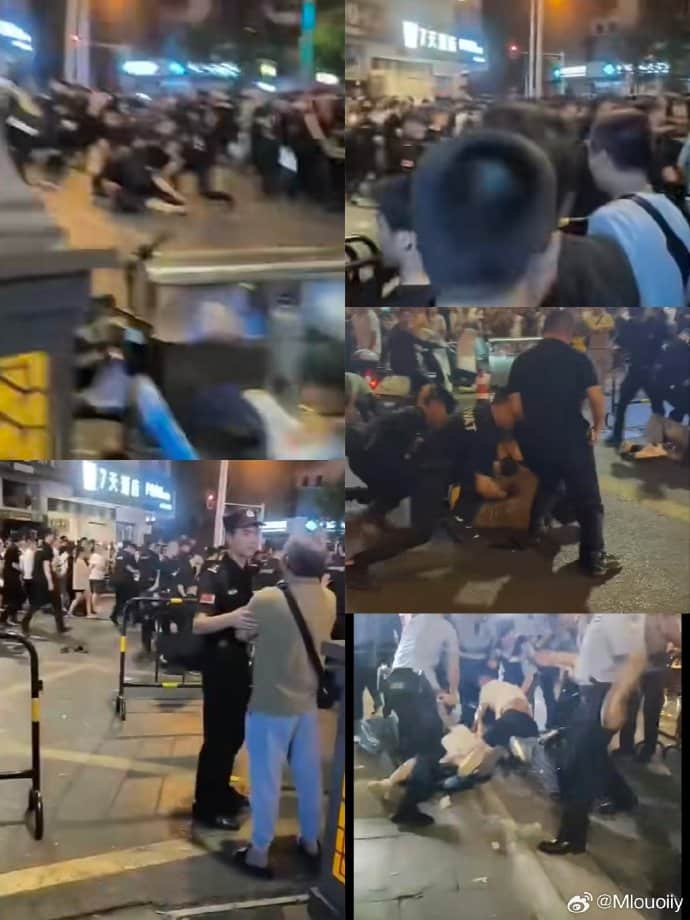
Images of the protest, posted on Weibo.
Near the east section of Shixian Road (诗仙路东段), more people gathered. Hundreds of individuals filming and livestreaming captured footage of the police crackdown—officers beating protesters, dragging them away, and deploying pepper spray.

Netizens’ digital artwork about the bullying incident, the parents’ grievances, and the public protest and its crackdown in Jiangyou. Shared by 程Clarence.
Although the protests briefly gained traction on social media and became a trending topic on Weibo, the search term was soon removed from the platform’s trending list.
Lasting Mental Scars
On Tuesday, August 5, several topics related to the Jiangyou bullying incident began trending again on Chinese social media.
On the short video app Kuaishou, a collective demand for justice surged to the number one spot, under the tag “A large number of Jiangyou parents demand justice for the victim” (江油大批家长为受害学生讨公道).
As of now, none of the perpetrators’ families have come forward to apologize.
As for Lai—according to the latest reports, she did not suffer serious physical injuries from the bullying incident, but according to her own parents, the mental scars will last. She will need continued mental health support and counseling going forward.
Although many posts about the incident and the ensuing protests have been taken offline, ‘Jiangyou’s Bullying Incident’ has already become one more case in the growing list of brutal school bullying incidents that have surfaced on Chinese social media in recent years. The heat of local anger may fade over time, but the rising number of such cases continues to fuel public frustration nationwide—especially if local authorities fail to do more to address and prevent school bullying.
“Not being able to protect our children, that’s a disgrace to our schools and the police,” one commenter wrote: “I want to thank all those mothers who have raised their voices for the bullied child. Each of us must say no to bullies, and we must do all we can to stop them. I hope the lawmakers agree.”
By Manya Koetse
(follow on X, LinkedIn, or Instagram)
Spotted a mistake or want to add something? Please let us know in comments below or email us. First-time commenters, please be patient – we will have to manually approve your comment before it appears.
©2025 Whatsonweibo. All rights reserved. Do not reproduce our content without permission – you can contact us at info@whatsonweibo.com.
Subscribe
Eye on Digital China is a reader-supported publication by
Manya Koetse (@manyapan) and powered by What’s on Weibo.
It offers independent analysis of China’s online culture, media, and social trends.
To receive the newsletter and support this work, consider
becoming a paid subscriber.

Get in touch
Have a tip, story lead, or book recommendation? Interested in contributing? For ideas, suggestions, or just a quick hello, reach out here.

The “Are You Dead Yet?” Phenomenon: How a Dark Satire Became China’s #1 Paid App

Trump, Taiwan & The Three-Body Problem: How Chinese Social Media Frames the US Strike on Venezuela

China’s 2025 Year in Review in 12 Phrases

China’s 10 Biggest Social Media Stories of 2025

Why Were 100,000 Pregnant Women’s Blood Samples Smuggled Out of China?

From Nobel Farewell to ‘VIP Toilets’: What’s Trending in China

China Trend Watch: Japan Tensions, Nexperia Fallout, Yunnan’s ‘Wild Child,’ & “Modern Opium”

Eye on Digital China: How Chinese Social Media Evolved from the Blog Era to the AI-driven Age

Signals: Hasan Piker’s China Trip & the Unexpected Journey of a Chinese School Uniform to Angola

Trump and Takaichi: The Unexpected Love Affair
Popular Reads
-

 China Arts & Entertainment6 months ago
China Arts & Entertainment6 months agoHidden Cameras and Taboo Topics: The Many Layers of the “Nanjing Sister Hong” Scandal
-

 China Insight8 months ago
China Insight8 months agoUnderstanding the Dr. Xiao Medical Scandal
-

 China Digital12 months ago
China Digital12 months ago“Dear Li Hua”: The TikTok/Xiaohongshu Honeymoon Explained
-

 China Insight5 months ago
China Insight5 months ago“Jiangyou Bullying Incident”: From Online Outrage to Offline Protest




